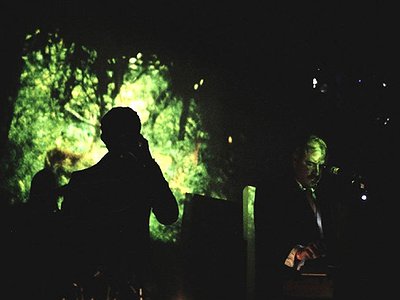When did you start writing/producing music - and what or who were your early passions and influences?
I've been playing music since the mid '90s, shortly after immigrating to Canada from the Middle East. I’m a huge fan of '70s and '80s punk and post punk, so a lot of that had, and still does have, quite an influence on my ideas and approach to how I create music.
What do you personally consider to be the incisive moments in your artistic work and/or career?
The moment I met my project partner, Malena Szlam, was a defining. Up to then, I felt that that this project was a music project that was accompanied by visuals, which was very frustrating. I had a hard time conceptualising the performances, and working in a manner that made the creation of the 16mm images a part of the building blocks for a performance. Meeting Malena, and working together changed that. She challenged me on all aspects of my process, and was only interested in co-creating oeuvres that were connected, in terms of what we 'see' and what we 'hear'. It was a really difficult thing to adjust to initially, as the process was very different from what I had been accustomed to, but I felt that the project grew out of that, and our work has become much more focused and challenging.
Shortly after that, meeting Jérémie and absorbing him into the aural aesthetic completed the recipe for the project, and gave me enough perspective to attempt working on an album after so many years.
What are currently your main compositional- and production-challenges?
Malena, Jéremie and my work is closely intertwined. She is such a master technician with her film medium, in both 16mm and super 8, and is using light and space as a canvas for creation. We feed so much off of each other and influence one another. Our biggest hurdle in creation is transforming a conceptual piece into an actual installation. Working in the medium of film requires a huge amount of patience coupled with vision, and it can be very very difficult as so much of the process is defined by trial and error.
What do you usually start with when working on a new piece?
A lyric. Always.
How strictly do you separate improvising and composing?
I’m quite a terrible musician when it comes to understanding music and composition. All the music I create is born from improvising within the realm that I understand. I have such a hard time with harmony and wrapping my head around it, which makes the idea of composing and arranging for an ensemble almost impossible. All the music I create is modal, drone based etc. and so much of that discipline is based in improvising within certain modal constraints.
How do you see the relationship between sound, space and composition?
Well it depends on what you mean. For JIMH, space is the single most important element of our work. We are first and foremost a performance project. Making a recorded album was actually quite difficult in concept as to me; it represented a compromise in what we do. The record represents the oeuvre but at 50 per cent. I know it sounds ridiculous but it’s quite true.
It was also a challenge to make the album's artwork represent our intentions. For our performances, we hang between 6 to 9 screens for our live shows, and use 3 to 7 16mm film projectors. You can imagine how limited we felt in creating the artwork which is made up of stills from our film loops. So the relationship of sound and space in that context is one into another, and of course, those two elements are the basis of composition for us.
Do you feel it important that an audience is able to deduct the processes and ideas behind a work purely on the basis of the music? If so, how do you make them transparent?
Not sure that that is even relevant in music or film. I love work that can be taken in on a first degree, on the surface, and just consumed on that level, but simultaneously, one can dig deep and go really far into the intentions the artist has behind the work and its meaning.
It can be about aesthetics as much as it can be about concept. Contemporary Portuguese filmmakers have mastered that skill. I sadly feel that most music is on a much more basic level. So much of what is made is just that; first degree, ear-candy production and slick visuals, but nothing beyond that first impression, or first-degree impression.
It's like eating a commercial chocolate bar. Your senses are wowed on the first bite, but from the second bite onwards you realise that what your eating is bullshit, and by the end of the bar, you want to throw up and wish you'd never eaten the damn thing.
In how much, do you feel, are creative decisions shaped by cultural differences – and in how much, vice versa, is the perception of sound influenced by cultural differences?
It's paramount for this project, as the thesis we propose is so much about a cultural difference. 2 of the 3 of us live in Canada, which is a really crazy country on so many levels. Crazy not because of the policies it holds, but crazy because of the image it sells and the opposing policies it holds. So, needless to say, culture is such a complicated idea here, as it is anywhere that a population exists.
In JIMH, I try to get as close as I can to crossing the line in addressing such issues, but always making sure that it remains coherent and relevant. We live in a society that is so awkward with itself on how it sees the 'other' that it ends up constantly making a mockery of itself, in its attempts to be open and tolerant, which in itself is such a racist idea.
I don't really know how to discuss such a broad topic, as this project faces constant criticism over its identity and how it presents it. Because of the imagery we use, the language I sing in and what people's perceived notions are of what all that means, we're accused of being ignorant to down right anti-Semitic, yet another term that has taken on a preposterously racist meaning. The dots people choose to connect are based on the very little information they have in relation to what they are seeing and hearing. I have no idea if I’m being clear here...



